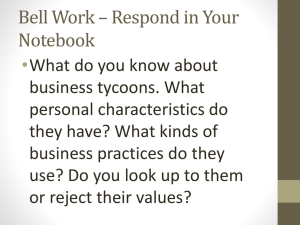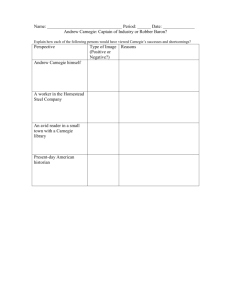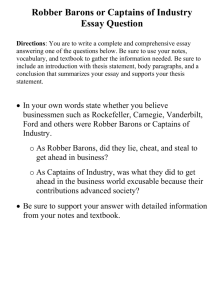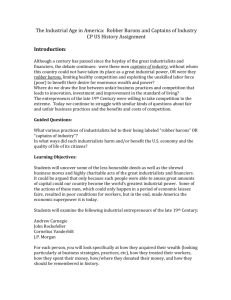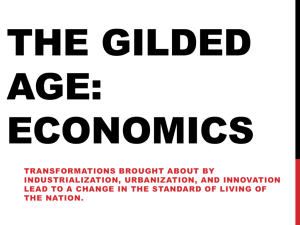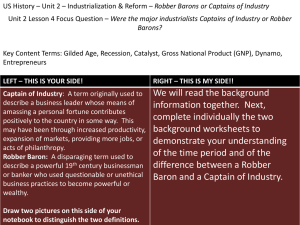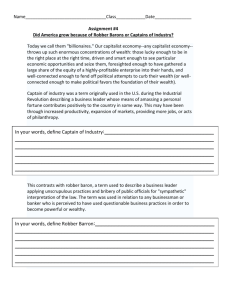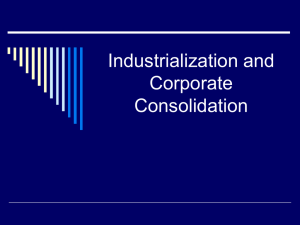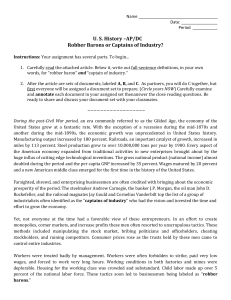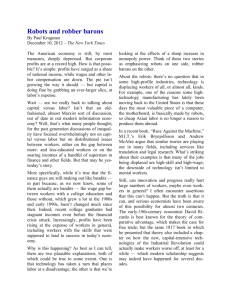American History Chapter 6: The Expansion of American Industry
advertisement
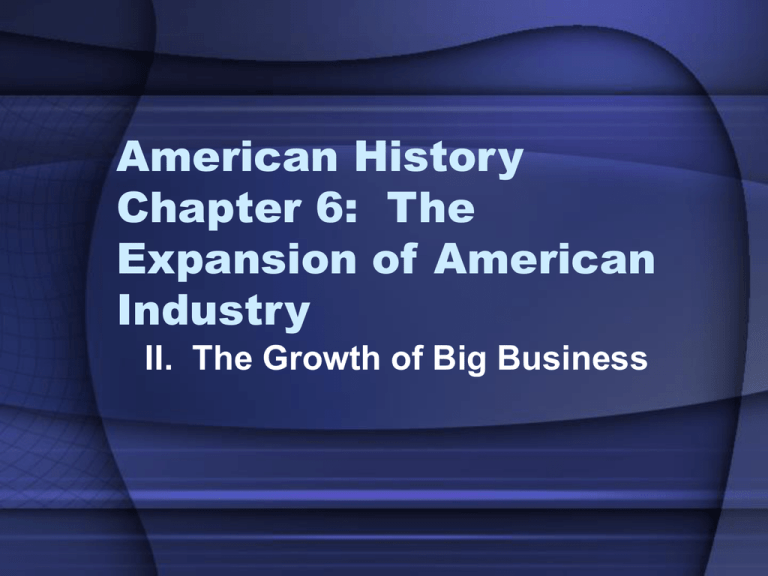
American History Chapter 6: The Expansion of American Industry II. The Growth of Big Business Objectives of Lesson: Key Concepts • Read to find out why American industrialists of the late 1800s were called both “robber barons” and “captains of industry”. • Discover how social Darwinism affected Americans’ views on big business. • Analyze the ways in which big businesses differed from smaller businesses. • Learn how industrialists gained a competitive edge over their rivals. Attention Getter • What is the difference between a “mom and pop” business and “big business”? Recall Prior Knowledge • What are some reasons why this period in history saw the birth and rapid growth of many different types of big business? Setting the Scene • Changes in the late nineteenth century business brought both great wealth and great hardship to the country. • New technology after the Civil War would set the stage for this growth, but it would also take smart and aggressive business people to make it happen. A) Robber Barons or Captains of Industry? • Were these business peoples Robber Barons or Captians of Industry? • If they are Robber Barons, it implies that the business leaders built their fortunes by stealing from the public • They Drained natural resources, paid officials, destroyed competitors, and paid workers nothing • If you think they are Captains of Industry, it suggests that these people served the nation in a positive way – built factories, raised productivity, expanded markets B) Social Darwinism • • 6) • • Charles Darwin theory on evolution say the fittest will survive – “natural selection” Robber Barons wanted 2 things – cheap labor and no government interference. They used Darwin’s theory of natural selection and applied it to the business world. Social Darwinism: extended Darwin’s concept to human society Robber Barons would argue that it was only natural that the strong became rich business leaders and the weak became poor workers. Government should not interfere with business – businesses that were the most fit would prosper C) Business on a Larger Scale • 1) 2) 3) 4) 5) 5 factors that combined to create new big business in the US Larger pools of capital – high start up costs limited industry Wider geographic span – railroads and telegraph – factories in different parts of US Broader Range of Operations – responsible for all stages of production Revised Role of Ownership – companies so big owner did not run it – managers New Methods of Management – accounting – specialized departments D) Gaining a Competitive Edge 7) Oligopoly – market structure which is dominated by a few large profitable firms – cereals and cars 8) Monopoly – complete control of a product or service 9) Cartels – loose association of businesses that make the same product • Limit supply to keep prices high a) Carnegie Steel • Carnegie built first steel plants to use the Bessemer process • Bought out all phases of steel industry – mines, furnaces, shipping and rail lines 10) Vertical consolidation: gaining control of many different businesses that make up all phases of a products development 11) Economies of scale: as production increases, the cost of each item goes down • Since he owned everything – he could charge less and drive the competitor out of business b) The Standard Oil Trust • John D. Rockefeller – started the Standard Oil Company in 1870 • Started buying his competitors oil refinery 12) Horizontal consolidation: bringing together of many firms in the same business 13) Trust – A group of separate companies that are placed under the control of a single managing board 14) Sherman Antitrust Act – tried to limit trusts – did not work – helped limit unions though. Summarize and Review • Why were American industrialists of the late 1800s called both “robber barons” and “captains of industry?” • How did social Darwinism affect Americans’ views on big business? • How did industrialists gain a competitive edge over their rivals? • In what ways did big business differ from smaller businesses? Process Information • Do you think that people like Carnegie and Rockefeller were Robber Barons or Captains of Industry? Why? Finished Section 6.2 • Once you finish, go back to the web-page and download and print quiz 6.2. After completing the quiz, send an e-mail to me with your answers. In the subject line put (your first and last name – quiz 6.2) • When you finish with that – check with the syllabus to find out when section 6.3 needs to be completed • Good Luck!
